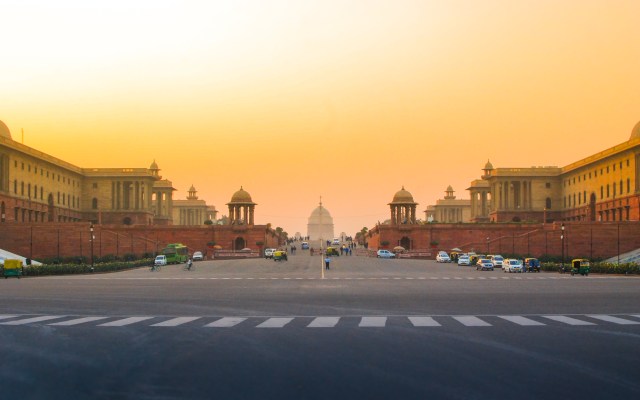India withdraws personal data bill that alarmed tech giants
The Indian government has withdrawn its long-awaited personal data protection bill, which has caught the attention of several privacy advocates and tech giants who feared that the legislation restricted how they handled sensitive information while giving the government broad powers to access it.
The move comes as a surprise as lawmakers recently indicated that the bill, unveiled in 2019, could see the light of day soon enough. New Delhi has received dozens of amendments and recommendations from a parliamentary panel, which includes lawmakers from Prime Minister Narendra Modi's ruling party, which "has identified many issues that are relevant but beyond the scope of a modern law on digital privacy," said India's junior IT minister, Rajeev. Chandrasekhar.
The government will now work on a “comprehensive legal framework” and present a new bill, he added.
The Personal Data Protection Bill sought to give Indian citizens rights over their data. India, the world's second-largest internet market, has seen an explosion of personal data over the past decade as hundreds of citizens logged on for the first time and began consuming dozens of apps. But there has been uncertainty about the power that individuals, private companies and government agencies have over it.
“The Personal Data Protection Bill 2019 has been thoroughly reviewed by the Joint Committee of Parliament. 81 amendments have been proposed and 12 recommendations have been made towards a comprehensive legal framework on the digital ecosystem.In view of the JCP report, a comprehensive legal framework is being developed.Therefore, under the circumstances, it is proposed to withdraw.The Personal Data Protection Bill, 2019 and presents a new bill that fits into the comprehensive legal framework,” Indian IT Minister Ashwini Vaishnaw said in a written statement on Wednesday.
The bill has drawn criticism from many industry players. New Delhi-based privacy group Internet Freedom Foundation said the bill "provides significant exemptions to government departments, prioritizes the interests of big business and does not sufficiently respect your fundamental right to privacy".
Meta, Google and Amazon are among the companies that have raised concerns about some of the joint parliamentary committee's recommendations on the bill.
The bill also provided that companies could only store certain categories of "sensitive" and "critical" data, including financial, health and biometric information in India.
“I hope the bill is not completely scrapped, given all the work that has gone into it. of privacy. Nobody wants that," Nikhil Pahwa, editor-in-chief of MediaNama, which covers politics and the media, said in a series of Twitter posts.
“The new bill should be subject to public consultation. The government should realize that civil society and wider industry participation contribute to improving laws and regulations. of key civil society players. The government has already made a mess with the IT Rules 2021 and CERT-in directions. It needs to be reasonable with the regulations or else it will hurt India's digital future."

The Indian government has withdrawn its long-awaited personal data protection bill, which has caught the attention of several privacy advocates and tech giants who feared that the legislation restricted how they handled sensitive information while giving the government broad powers to access it.
The move comes as a surprise as lawmakers recently indicated that the bill, unveiled in 2019, could see the light of day soon enough. New Delhi has received dozens of amendments and recommendations from a parliamentary panel, which includes lawmakers from Prime Minister Narendra Modi's ruling party, which "has identified many issues that are relevant but beyond the scope of a modern law on digital privacy," said India's junior IT minister, Rajeev. Chandrasekhar.
The government will now work on a “comprehensive legal framework” and present a new bill, he added.
The Personal Data Protection Bill sought to give Indian citizens rights over their data. India, the world's second-largest internet market, has seen an explosion of personal data over the past decade as hundreds of citizens logged on for the first time and began consuming dozens of apps. But there has been uncertainty about the power that individuals, private companies and government agencies have over it.
“The Personal Data Protection Bill 2019 has been thoroughly reviewed by the Joint Committee of Parliament. 81 amendments have been proposed and 12 recommendations have been made towards a comprehensive legal framework on the digital ecosystem.In view of the JCP report, a comprehensive legal framework is being developed.Therefore, under the circumstances, it is proposed to withdraw.The Personal Data Protection Bill, 2019 and presents a new bill that fits into the comprehensive legal framework,” Indian IT Minister Ashwini Vaishnaw said in a written statement on Wednesday.
The bill has drawn criticism from many industry players. New Delhi-based privacy group Internet Freedom Foundation said the bill "provides significant exemptions to government departments, prioritizes the interests of big business and does not sufficiently respect your fundamental right to privacy".
Meta, Google and Amazon are among the companies that have raised concerns about some of the joint parliamentary committee's recommendations on the bill.
The bill also provided that companies could only store certain categories of "sensitive" and "critical" data, including financial, health and biometric information in India.
“I hope the bill is not completely scrapped, given all the work that has gone into it. of privacy. Nobody wants that," Nikhil Pahwa, editor-in-chief of MediaNama, which covers politics and the media, said in a series of Twitter posts.
“The new bill should be subject to public consultation. The government should realize that civil society and wider industry participation contribute to improving laws and regulations. of key civil society players. The government has already made a mess with the IT Rules 2021 and CERT-in directions. It needs to be reasonable with the regulations or else it will hurt India's digital future."
What's Your Reaction?





















